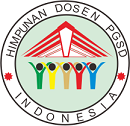SYSTEMATIC LITERATURE REVIEW : TREND PENELITIAN MODEL PEMBELAJARAN CONCEPTUAL LEARNING DI PERGURUAN TINGGI
Abstract
This research aims at using appropriate learning models to help students avoid misconceptions and help students construct new knowledge through appropriate learning models. The method used is a systematic literature review taken from national journals and international journals. Search for library sources in this article via Google, SagePub, Science Direct, Emerald Insight, Hindawi, Springer, Taylor and Francis, and Wiley databases for 2013-2024. Based on the results of the study, it was found that the concept learning model is a learning model that has the view that students are not only required to be able to form concepts through classifying data, but they must also be able to form concepts using their own abilities. By using the concept learning model in the learning process, it is hoped that students' understanding of concepts will increase. The concept learning model is designed to teach concepts and help students more effectively learn the concepts of the material they are studying so that it can significantly help them in the process of improving their learning outcomes. This model is an efficient method of presenting structured and planned information from a wide range of topics for students at every level of development.
Keywords
Full Text:
PDFReferences
Adam Shore and Track Dinning. (2023). Developing student’s skills and work readiness: an experiential learning framework.
Bargavi Ravichandran and Kavitha. (2023). Adoption of EdTech products among college students: a conceptual study. Shanmugam Faculty of Management, SRM Institute of Science and Technology (Deemed to be University), Chengalpattu, India.
Cahyanti, R.P.A.D., Putra, S., Wiarta, W.I. Model pembelajaran konseptual interaktif Berorientasi pada kemampuan penalaran berpengaruh Terhadap hasil belajar metematika. (2013).
Darmayanti. Efektifitas Model Pembelajaran Conceptual Understanding Procedures (Cups) Terhadap Hasil Belajar Fisika Mahasiswa Kelas X Sma Muhammadiyah Enrekang. (2017).
Ean-Teng Khor and Sheng-Hung Chung. Performance Evaluation Of Conceptual Model Instance (Cmi) Data For E-Learning Multimedia Presentations In Scorm Run-Time Environment. (2023).
Francesc Garcia I Grau, Cristina Valls, Núria Piqué & Héctor Ruiz-Martín. The long-term effects of introducing the 5E model of instruction on students’ conceptual learning. (2021).
Fukaya, T., Suzuki, M., Ozawa I., Nakagoshi. T. An Examination of Related Factors of Mathematical Pedagogical Content Knowledge in Elementary School Teachers: Focusing on Conceptions of Teaching and Learning and Test Utilization Strategy. (2022).
Gede Suwardika, Agus Tatang Sopandi, I. Putu Oktap Indrawan Kadek Masakazu. A flipped classroom with whiteboard animation and modules to enhance students’ selfregulation, critical thinking and communication skills: a conceptual framework and its implementation. (2024).
Giacomo Zuccarini and Massimiliano Malgieri. Modeling and Representing Conceptual Change in the Learning of Successive Theories. (2022).
Gregory M. Donoghue & Jared C. Horvath. Translating neuroscience, psychology and education: An abstracted conceptual framework for the learning sciences. (2016).
J. Parthasarathy. Content analysis of Biology textbooks across selected educational boards of Asia for misconceptions and elements of conceptual change towards learning ‘Cell Structure’. (2023).
Jan D. Vermunt, Sonia Ilie & Anna Vignoles. Building the foundations for measuring learning gain in higher education: a conceptual framework and measurement instrument. (2018).
Kristina Rosentha, Stefan Strecker, Monique Snoeck. Modeling difficulties in creating conceptual data models. (2022).
Laura B. Perry, Michael Their, Paul Beach, Ross C. Anderson, Niklas Max Thoennessen, Philip Roberts. Opportunities and conditions to learn (OCL): A conceptual framework. (2023).
Linda De George-Walker and Mark A. Tyler. Collaborative Concept Mapping: Connecting with Research Team Capacities. (2013).
Marja G. Bertrand and Immaculate K. Namukasa. A pedagogical model for STEAM education. (2022).
Muliani, E.D. Penerapan pembelajaran konseptual interaktif berbantuan media cmaptools untuk meminimalkan miskonsepsi. (2019).
Muslim, L.L., Verawati, P.S.N.N., Makhrus, M. Validity and Reliability of Learning Tools Based on Discovery Learning Model to Improve Creative Thinking Ability and Concept Understanding. 2021.
Nguyen Hoang Thuan and Pedro Antunes. A conceptual model for educating design thinking dispositions. (2024).
Nicholas A. Gage and Kristin Lierheimer. Exploring Self-Concept for Students with Emotional and/or Behavioral Disorders as They Transition from Elementary to Middle School and High School. (2013).
Pilai, K.R., Upadhyaya, P., Balachandran, A., Nidadavolu, J. Versatile Learning Ecosystem: A Conceptual Framework. (2019).
Robin Samuelsson. Multimodal interaction for science learning in preschool: Conceptual development with external tools across a science project. (2019).
Sandoval, R.T.M., Oviedo, B.M.G., Torres, R.I.M. From preconceptions to concept: The basis of a didactic model designed to promote the development of critical thinking. (2022).
Seunghye Ha and Hyo-Jeong So. Examining the Effects of the Utility Value Intervention on Learners’ Emotions and Conceptual Understanding in Online Video-based Learning. (2023).
Supu, A., Mowata, B.J., Yusuf, H.Y. Penerapan model pembelajaran perubahan konseptual dengan teknik Analogi penghubung dalam pembelajaran fisika untuk meningkatkan Pemahaman konsep Mahasiswa kelas VIII smp swasta diakui adhyaksa 2 kupang. (2018).
Thomas Howard Morris, Nicholas Bremner & Nozomi Sakata. Self-directed learning and student-centred learning: a conceptual comparison. (2023).
Ugwuanyi, S.C., Ezema, J.M., Orhi, I, E. Evaluating the Instructional Efficacies of Conceptual Change Models on Students’ Conceptual Change Achievement and Self-Efficacy in Particulate Nature Matter in Physics. (2023).
Yusuke Uegatani, Hiroki Otani,· Shintaro Shirakawa, Ryo Ito. Real and illusionary difficulties in conceptual learning in mathematics: comparison between constructivist and inferentialist perspectives. (2023).
DOI: https://doi.org/10.24114/sejpgsd.v14i4.65922
Article Metrics
Abstract view : 49 timesPDF - 29 times
Refbacks
- There are currently no refbacks.
School Education Journal PGSD FIP UNIMED
School Education Journal PGSD FIP UNIMED is licensed under a Creative Commons Attribution 4.0 International License.










.png)
